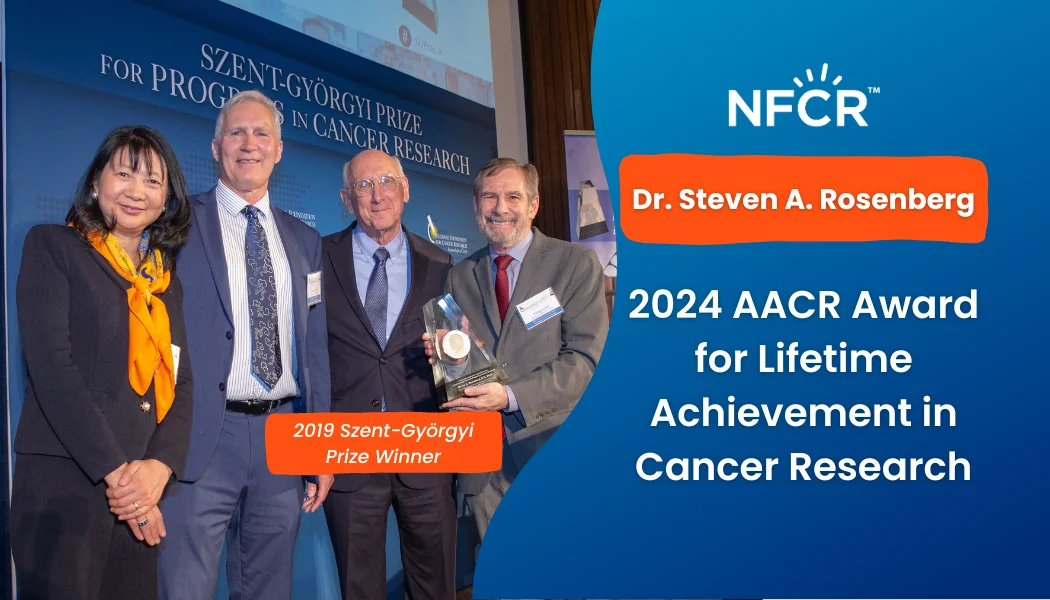NFCR Congratulates Dr. Steven A. Rosenberg on his Lifetime Achievement Award

The National Foundation for Cancer Research (NFCR) congratulates Dr. Steven A. Rosenberg for being honored with the 2024 American Association for Cancer Research (AACR) Award for Lifetime Achievement in Cancer Research.
Dr. Rosenberg, a senior investigator at the Center for Cancer Research at the National Cancer Institute, is being recognized for his revolutionary contributions to cancer immunotherapy research and patient care. He was also recently awarded the 2023 National Medal of Technology and Innovation by President Biden, the nation’s highest honor for technological achievement, further highlighting his exceptional impact on cancer treatment. Additionally, he was awarded the 2019 Szent-Györgyi Prize for Progress in Cancer Research presented by NFCR.
Dr. Rosenberg’s Impact on Cancer Research
Dr. Rosenberg’s work has led to the development of the first FDA-approved cancer immunotherapy, which has changed the landscape of cancer care. His research on interleukin-2 (IL-2) and tumor-infiltrating lymphocytes (TILs) has transformed cancer treatment, particularly in metastatic melanoma and metastatic renal cell cancers.
Building on his initial IL-2 studies, Dr. Rosenberg’s work on harnessing TILs for melanoma patients established the field of adoptive cell transfer therapy. His innovative approach of stimulating patient-derived TILs with IL-2 and reintroducing them back into patients to trigger tumor regression was revolutionary in the field of oncology. This technique helped establish similar cell transfer therapies for other cancers, including hepatocellular carcinoma, breast cancer, and colorectal cancer. Dr. Rosenberg’s work has also fueled the development of chimeric antigen receptor (CAR) T-cell therapy. CAR T-cell technology has continued to evolve and was FDA-approved in 2017 for various blood cancers, with ongoing improvements and adaptations for other cancer types.
Dr. Rosenberg’s 2019 Szent-Györgyi Prize Award
Dr. Rosenberg’s achievements in immunotherapy have shattered the boundaries of what was once thought impossible in the battle against cancer, the impact of his contributions has been acknowledged by various prestigious organizations throughout his career. NFCR recognized Dr. Rosenberg’s basic, translational, and applied research efforts with the 2019 Szent-Györgyi Prize for Progress in Cancer Research.
His discoveries extend beyond cytokine therapy to encompass engineered immune system treatments such as checkpoint inhibition and adoptive cell transfer therapies. These advancements paved the way for the development of drugs like Proleukin (approved in 1992), Yervoy (approved in 2011), and Yescarta (approved in 2017).
Following his 2019 Award ceremony, Dr. Rosenberg continues to participate in NFCR’s Global Summit & Award Ceremonies for Cancer Research & Entrepreneurship sharing his insights among the cancer research community.
NFCR’s Proven Track Record of Identifying Promising Research
NFCR has a history of supporting and highlighting pioneers whose work has made significant breakthroughs in cancer research and corresponding high-impact benefits for patients. Other notable winners of the Szent-Györgyi Prize for Progress in Cancer Research include James P. Allison, Ph.D. (Nobel Laureate), Susan Band Horwitz, Ph.D. (Canada Gairdner International Award Winner), Doug R. Lowy, M.D. and John T. Schiller, Ph.D. of the National Cancer Institute and many more.
As we celebrate Dr. Rosenberg’s accolades, we are reminded of the profound impact that a visionary mind can have on the lives of millions. His groundbreaking discoveries and unwavering dedication resulted in the development of novel immunotherapies, offering hope to countless cancer patients worldwide and igniting a perpetual quest for innovative treatments that will continue to shape the future of oncology and improve patient outcomes.
Speaking to Rosenberg’s 2019 Szent-Györgyi Prize Win, NFCR President and CEO Sujuan Ba, Ph.D. said, “The impact of Dr. Rosenberg’s discoveries and pioneering work is phenomenal for cancer patients and the research community. Like many Szent-Györgyi Prize winners, we are glad to see Dr. Rosenberg receive continued recognition for his sustaining impact within the community. Thank you, Dr. Rosenberg for your contributions, and congratulations on this well-deserved recognition.”
Sign-up to Stay Informed About Cancer Research Breakthroughs with NFCR!
A world without cancer is possible. Help us turn lab breakthroughs into life-saving realities.

5.7 Million+
Donors who have fueled NFCR’s mission

$420 Million+
Invested in high-impact research & programs

36+ Labs & Hundreds of
Nobel Laureates & Key Scientists received NFCR funding, driving breakthrough research












